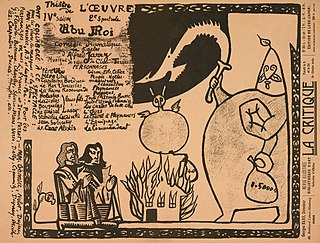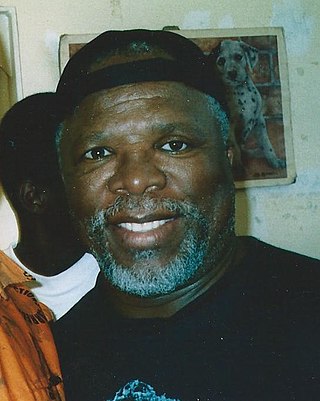
The Truth and Reconciliation Commission (TRC) was a court-like restorative justice body assembled in South Africa in 1996 after the end of apartheid. Authorised by Nelson Mandela and chaired by Desmond Tutu, the commission invited witnesses who were identified as victims of gross human rights violations to give statements about their experiences, and selected some for public hearings. Perpetrators of violence could also give testimony and request amnesty from both civil and criminal prosecution.

Ubu Roi is a play by French writer Alfred Jarry, then 23 years old. It was first performed in Paris in 1896, by Aurélien Lugné-Poe's Théâtre de l'Œuvre at the Nouveau-Théâtre. The production's single public performance baffled and offended audiences with its unruliness and obscenity. Considered to be a wild, bizarre and comic play, significant for the way it overturns cultural rules, norms and conventions, it is seen by 20th- and 21st-century scholars to have opened the door for what became known as modernism in the 20th century, and as a precursor to Dadaism, Surrealism and the Theatre of the Absurd.

The South African Special Forces Brigade, colloquially known as the Recces, is South Africa's principal special operations unit, specialising in various types of operations, including counter-insurgency, long-range-reconnaissance, unconventional-warfare, special operations, hostage-rescue, and direct-action operations. The brigade operates with two active-duty groups, with 4 Special Forces Regiment focusing on maritime operations, and 5 Special Forces Regiment focusing on land and airborne operations. Only about 8% of recruits who undergo South African special forces training pass the course.

Bonisile John Kani is a South African actor, author, director and playwright. He is known for portraying T'Chaka in the Marvel Cinematic Universe films Captain America: Civil War (2016) and Black Panther (2018), Rafiki in the 2019 remake of The Lion King and Colonel Ulenga in the Netflix film Murder Mystery (2019).
Jan Dirk Breytenbach is a retired career South African Special Forces military officer and author of military books. He is best known as the first commander of 1 Reconnaissance Commando, South Africa's first special forces unit. In his long career, he served in the Suez Crisis, the Biafran War, the South African Border War, and the Angolan Civil War, and attained the rank of colonel before his retirement.

William Kentridge is a South African artist best known for his prints, drawings, and animated films, especially noted for a sequence of hand-drawn animated films he produced during the 1990s. The latter are constructed by filming a drawing, making erasures and changes, and filming it again. He continues this process meticulously, giving each change to the drawing a quarter of a second to two seconds' screen time. A single drawing will be altered and filmed this way until the end of a scene. These palimpsest-like drawings are later displayed along with the films as finished pieces of art.
The Battle of Cuito Cuanavale was fought intermittently between 14 August 1987 and 23 March 1988, south and east of the town of Cuito Cuanavale, Angola, by the People's Armed Forces for the Liberation of Angola (FAPLA) and advisors and soldiers from Cuba, USSR, Vietnam, ANC and SWAPO against South Africa, and soldiers of the National Union for the Total Independence of Angola (UNITA) during the Angolan Civil War and South African Border War. The battle was the largest engagement of the Angolan conflict and the biggest conventional battle on the African continent since World War II. UNITA and its South African allies defeated a major FAPLA offensive towards Mavinga, preserving the former's control of southern Angola. They proceeded to launch a failed counteroffensive on FAPLA defensive positions around the Tumpo River east of Cuito Cuanavale.
Operation Displace was a military operation by the South African Defence Force during the South African Border War and Angolan Civil War. It involved maintaining the illusion that the SADF had remained in brigade strength east of Cuito Cuanavale at the end of April 1988 and the eventual withdrawal of all South African military units from south-eastern Angola during August 1988.
Operation Wallpaper was a military operation by the South African Defence Force (SADF) during the Angolan Civil War and South African Border War.
The military history of South Africa chronicles a vast time period and complex events from the dawn of history until the present time. It covers civil wars and wars of aggression and of self-defence both within South Africa and against it. It includes the history of battles fought in the territories of modern South Africa in neighbouring territories, in both world wars and in modern international conflicts.
Paul Herzberg is an actor and writer, known for The Honourable Woman (2014), Black Earth Rising (2019), My Week with Marilyn (2011), Room 36 (2005), Blood and Cry Freedom (1987).
Ubu and the Truth Commission is a South African play by Jane Taylor. It was first produced on 26 May 1997, directed by William Kentridge at The Laboratory in Johannesburg's Market Theatre.
The Story I Am About to Tell was a successful South African play by Duma Kumalo. Produced by a support group for survivors giving testimony at the Truth and Reconciliation Commission, and starring three of them, it ran for five years both at home and abroad.
Jane Taylor is a South African writer, playwright and academic. She currently holds the Andrew W. Mellon Chair of Aesthetic Theory and Material Performance at the Centre for Humanities Research at the University of the Western Cape in South Africa. She is the director of the Laboratory of Kinetic Objects (LoKO), a Centre for the theoretical and material exploration of the Subject/Object continuum. The Centre engages in performance arts as well as research and intellectual enquiry into the human and technological interface, Artificial Intelligence (AI) Intelligent Amplification (IA). Her recent performance/lecture “Ne’er So Much the Ape” [which takes its title from an old English adage, ‘ne’er so much the Ape as when he wears the doctor’s cape’] explores the articulation of primate research, race theory, AI, and performance theory.

The Handspring Puppet Company is a puppetry performance and design company established in 1981 by Adrian Kohler, Basil Jones, Jon Weinberg and Jill Joubert. It is based in Cape Town, South Africa.
Deborah Bell is a South African painter and sculptor whose works are known internationally.

Philip Miller is a South African composer and sound artist based in Cape Town. His work is multi-faceted, often developing from collaborative projects in theatre, film, video and sound installations.

Jo Ractliffe is a South African photographer and teacher working in both Cape Town, where she was born, and Johannesburg, South Africa. She is considered among the most influential South African "social photographers."
Catherine Meyburgh is a South African film editor, filmmaker, artist and project designer.
Dawid Minnaar, is a South African actor and dramatist. Started his career in theatre in 1980s, Minnaar later made many popular roles in the television serials such as, 7de Laan, Amalia and Binnelanders.







